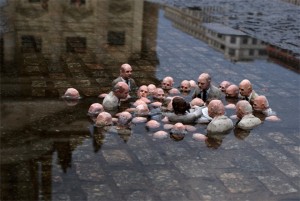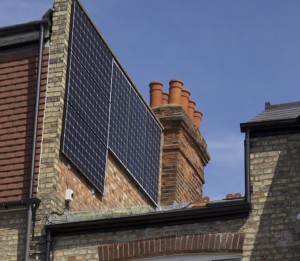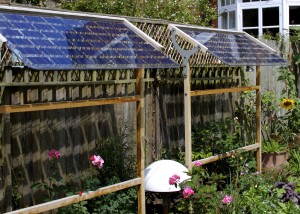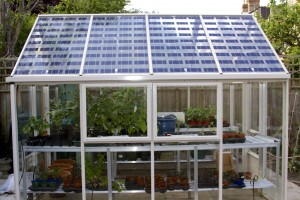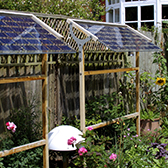
In this talk on climate change I’ll start with a personal story. This spring my husband and I installed solar energy at home. I experienced a moment of shock and shame when, feeling pleased it was up and running, I asked myself why did it take us so long to do this?
American Psychoanalytical Association (APsaA)
Annual Conference
Chicago
5th June 2014
‘TED’ STYLE TALK ON CLIMATE CHANGE
In this talk on climate change I’ll start with a personal story. This spring my husband and I installed solar energy at home. I experienced a moment of shock and shame when, feeling pleased it was up and running, I asked myselfwhy did it take us so long to do this?
Solar panels are cheaper now but this was not enough of a reason why only now. We are middle class and spend money on expensive holidays. Was I saying solar had been too expensive but holidays had not been too expensive? Suddenly I saw I had not been willing to forego even one of these holidays to fund solar energy and this shocked me.
I’m aware that I could sound like the Ancient Mariner, wanting to waylay you on your way to the party that closes this conference, unburdening myself by telling you about an albatross I found hanging round my neck. I hope this is not my intention.
My intention is to look at what it feels like to live in, and struggle to emerge from, a culture enough to see it a bit more clearly. My assumption is that although my particular story and subjectivity are unique to me, people who share a culture also share similar reactions to the culture.
I will now look at our shared culture, and then return to my personal moment of shame.
I suggest our current culture:
- Actively promotes a way of living driven by an inflated sense of entitlement to the earth’s resources.
- Actively promotes denial of the damage this way of living causes.
Super entitlement and denial of damage are both fuelling our rising carbon emissions. Climate change then is not an environmental problem. It is a consequence of our ways of thinking and living.[i]
I want to be clear I’m not suggesting an idealized way that we can live without causing any damage. Rather, I am addressing that current industrial practices in a deregulated global economy where polluters pollute for free are causing unsustainable levels of damage: as consumers we are all directly implicated in these damaging practices in our daily lives.
We have the technological knowhow to address climate change.[ii] What we need to find is the human will to act. The problem is that our serious denial about climate change saps our will to act.
We have seen a significant shift in the culture over the past 30 or so years. This is towards a position ‘as if’ there is no shame and guilt about the damage caused by our current way of life. This is part of our denial. It discounts our bedrock humanity.
Shame and guilt help us to know when we have gone too far and need to apply the brakes. A leader like the late British Prime Minister, Margaret Thatcher knew this very well when the first thing she did was tell us that what we had thought was bad was good, and what we thought was good was bad. She framed new cultural ego ideals for the new more rapacious economy that she helped put in place.
Our social groups play a crucial role in enforcing the dominant set of cultural ego ideals through selective praising and shaming. Not to conform to a group’s dominant ego ideals is to risk shame and possible exclusion from the group.
Isaac Cordal’s sculpture conveys the state of our current culture:
This brilliant street art helps us see climate change denial as a collective psychic retreat from reality. Here, I’m applying John Steiner’s idea of a psychic retreat[iii] to the group. In the retreat, we turn a blind eye to the damage we are doing, and live in an ‘as if’ virtual world[iv].
The perspective Cordal offers us of ourselves is shocking. It is always a shock to emerge from a psychic retreat to take a more realistic look at oneself and one’s relationships.
The sculpture suggests that, in our psychic retreat, even as we drown in denial, we remain tremendously preoccupied with our status and position within our social groups. Those at the centre of the group seem to be the most secure, even cosy.
Cordal has given this sculpture various titles. One is “climate change”. Another is “follow the leader”. I suggest we are led here by a group culture that collectively turns a blind eye and ignores the big picture.
The sculpture conveys the way damage inexorably mounts up. It conveys the way the damage is also to our minds: the more we deny reality, the more flooded and traumatized we feel when we do face it – or it faces us, as it inevitably does. We do not have an infinite capacity to bear the feelings that come when we see the extent of damage in which we are implicated.[v]
We see that two figures on the left hand side at the top are a bit more separate. One has gone under while the other is looking out more, not just inwards, and his expression seems to me somewhat shocked and dazed. I identify with both these figures. Sometimes the problem of climate change feels overwhelming to me. But right now my point of identification is with the figure I see as looking out and looking dazed.
I was shocked when I thought about why I hadn’t installed solar panels before, and had chosen expensive holidays instead. I found myself thinking about my social groups. For most of them, an important and frequent topic of conversation is where everyone is going on holiday. I realized I had feared being socially shamed by not joining in. I realized I also feared arousing group animosity if I challenged the group culture. I feared losing my place in groups of people I love, value and need. [vi]
I found myself having yet another imaginary conversation with my grand children. I was looking them in the eye and saying, “the thing is, when it came to it, you did not matter to me enough to face some real – or indeed not even real but imagined – difficulties with friends and colleagues”. It was not my grand children who were accusing me of a lack of care. I was accusing myself. I was not living up to my own ideal of protecting those I love. I felt cowardly. [vii]
The current culture [viii]of denial and entitlement is a culture of uncare. Do we dare challenge uncare in our social groups? If we do, are we perhaps being self-righteous and holier than thou? For instance, is it easier for me to take greater risks with my colleagues now, because at my age I am no longer so dependent on them for referrals?
How do we live in a culture of uncare, one that prefers ‘as if’ solutions to genuine repairs? How do we live in a more caring way? Because it is green wash to pretend it is easy.
At this point we may well be tempted back into the psychic retreat of denying climate change, passing the buck, naming and shaming, and doing all the things we do.
To return to my story, we installed 6 conventional solar panels at roof level:
and 8 in the garden. All the garden solar panels use a technology where solar cells are inserted into glass.4 of these panels are ‘planted’, as it were, in the garden:
and four are the roof of our new greenhouse:
Of course I can’t through one individual action protect those I love from the extent of the damage we face, or address the social inequality that makes it beyond the reach of most people to install solar panels. To think I could would be a flight into manic repair. But this does not mean it is useless to try to make what repairs we can and to fight for change.
I agree with climate activist Bill McKibben[ix] when he says:
| My roof is covered with solar panels and so on; it’s important to do stuff at home. But I don’t try to fool myself that that’s going to stop climate change. … It’s a structural problem. |
I also agree with Naomi Klein[x] when she says:
|
Climate change is the fight of our lives. |
I would put it that climate change is the fight for life itself.
I believe that to experience moral pain I needed to be able to stand back from the group culture I am immersed in and also get close enough to it to feel affected by it. I know I find it easier to picture the culture and easier to see how others are drawn into colluding with the culture, than to see its effects on myself.
It is difficult to know what caused a shift in me. Some factors seem important to me: I think I have been on a barely conscious journey of repair to my ideals; I’ve been greatly helped and contained by others who have shown leadership in their capacity to stand up to the current group culture and take the consequences. Also, making an actual carbon repair helped me bear some of my guilt and shame more squarely. In addition, I sense a recent shift towards more concern and respect for the reality of climate issues in my groups. In the words of Saul Bellow, “Human kind cannot bear too much reality but it cannot bear too little either”.[xi]
Rob Nixon[xii] – here at this conference – has put forward the concept of slow violence. We have suffered such bit, by bit, violence to our caring ideals over the past 30 years that it amounts to a form of cultural devastation. I have been very moved to read Jonathan Lear’s[xiii] analysis of radical hope in a time of cultural devastation. How does one keep one’s ideals of care alive when at the same time relating to people – including oneself – caught up in an uncaring culture? How does one live a life that does not feel shameful?
Taking the step to install solar energy has left me energized, but, in the words of Coleridge’s poem, also sadder and wiser; well definitely sadder and I hope a bit wiser.
[i] This perspective is put forward by Zygmunt Bauman. Bauman, Z. (2013). Participant on Vetenskapens varld lot 23, stv (Swedish public broadcasting channel) aired 23.09.13. http:/www.svtplay.se/video/1480596/del-23. Also by Naomi Klein (2014) “Climate change is the fight of our lives yet we can hardly bear to look at it”. http://www.theguardian.com/commentisfree/2014/apr/23/climate-change-fight-of-our-lives-naomi-klein
[ii] See speeches at the Radical Reductions Emissions Conference, a 2-day multidisciplinary conference held at the Royal Society in London in 2013 organized by the Tyndall Centre for Climate Research: http://tyndall.ac.uk/communication/news-archive/2013/radical-emissions-reduction-conference-videos-now-online
[iii] Steiner, J. (1993). Psychic retreats. London:Routledge.
[iv] See Hoggett, P. (2012). “Climate Change in a Perverse Culture”. In Weintrobe, S. (2012) ed. Engaging with Climate Change. London and New York: Routledge.
[v] As Ruth Leys has put it, if the 20th century was the century of the libido, the 21st century will be the century of the posttraumatic self. Leys, R. (2000). Trauma: a Genealogy. Chicago: University of Chicago Press.
[vi] Ro Randall has written on carbon conversation groups that support efforts to reduce one’s carbon emissions. See (2009) Carbon Conversations – handbook, facilitator’s guide and games pack. Stirling: Surefoot Effect. www.carbonconversations.org
[vii] For a discussion of the power of groups to silence deeper felt ego ideals, see TEXx talk by republican conservative Bob Inglis. Inglis, initially a strong advocate for fossil fuels, argues that what shifted his perspective was realizing he had a “new constituency”, ie: his son and family, who challenged him on his climate views. https://www.facebook.com/EandEI/posts/348107128665948.
[viii] See my talk on the culture of uncare under talks and interviews.
[ix] Bill McKibben 350.org Fossil Free tour 2013 Netherlands: http://www.youtube.com/watch?v=e6I6GbZ5lZU
- [x] Naomi Klein. “Climate change is the fight of our lives yet we can hardly bear to look at it”. http://www.theguardian.com/commentisfree/2014/apr/23/climate-change-fight-of-our-lives-naomi-klein
[xi] Bellow in his acceptance speech for the Nobel Prize for Literature.
[xii] Nixon, R. (2011). Slow Violence and the Environmentalism of the Poor. Cambridge: Harvard University Press.
[xiii] Lear, J. (2008). Radical Hope: Ethics in the face of cultural devastation. Cambridge: Harvard University Press.
